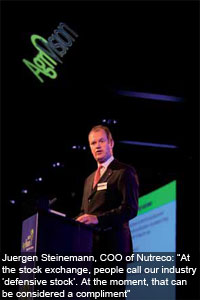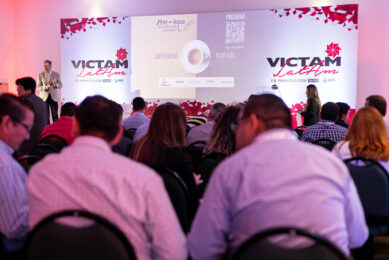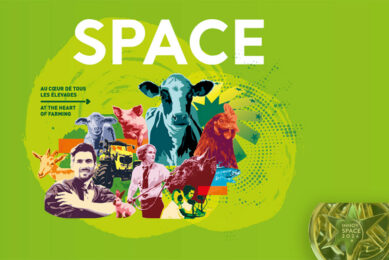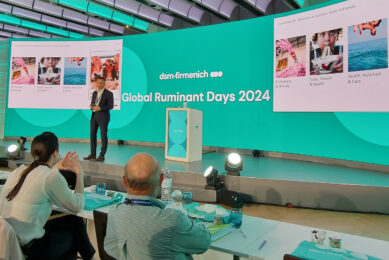Agri Vision 2009 – Shifting horizons

The fifth edition of Agri Vision, to be held in June in the Netherlands, will take place in a completely different environment to that of two years ago. Optimism, growth and high feed prices have been replaced by care, recession and volatility. Organising company Nutreco will encourage delegates to think about joint, global solutions.
For most people working in the animal husbandry industry, nothing can be more frustrating than the ‘ambivalent consumer’. Juergen Steinemann, Chief Operating Officer (COO) at Nutreco Holding, headquartered in Amersfoort, the Netherlands, is no exception to that rule.
“On Sunday, when sitting on the sofa, this consumer enjoys to see pigs roaming free in the countryside,” he says. “This attitude, however, changes when the same person approaches the supermarket where he or she buys the meat, during the rest of the week. All of a sudden, money also plays a vital role – and the cheaper, non-organic meat will often be bought.”
Although a well-known and often-heard complaint, the statement is more topical than ever, considering the financial crisis that is currently going on. Mortgages and loans are scarce, recession is gaining ground worldwide and employees are losing jobs all over the world. People are watching their expenses – as any industry will know.
Steinemann knows, however, that Nutreco, Dutch holding company of several animal nutrition companies like Trouw Nutrition, Nanta, Hendrix, Nutreco Canada and Skretting, are among the kind of companies that are well prepared to respond to the effects of a global financial downturn. “We are not in the machinery business; we are not in the car business. We offer our customers nutrition and health solutions for their animals, through a range of products and programmes, geared towards achieving optimum business results. Our feed products are linked to the basic needs of consumers for food products such as dairy products, meat and fish. There could be a shift in consumer spending to less expensive items, but consumers will continue to eat. The impact on total livestock numbers will be limited, which means that the demand for animal nutrition and fish feed will continue at or close to current levels.
“Our company is part of the food chain. Hence we do not see losses of 14 or 15% – in general, we are working in a stable industry. At the stock exchange, people call our industry ‘defensive stock’. At the moment, that can be considered a compliment.”
Figures for 2008, announced in February, reflect that trend: the company’s revenues went up 22.9% to €4.9 billion, with strong results in premix and feed specialties. Operating results went up 14.7% to €182 million – and the company expects to meet €230 million in 2010-2012.
Confident as Steinemann may be that the financial crisis will prove to be temporal, Nutreco saw that the time was there to have a look internally into what could be done to improve its own organisation. He says: “At the moment, we are looking where to improve the business. It’s about doing those things that you had always wanted to but never found the time for, think about cutting away ‘wrong capital’ and reducing costs. There’s no need to explain things like these to our employees – they’ll understand.”
Restructuring
The crisis follows the finishing of a major internal and external refocusing operation, called ‘Rebalancing for Growth’, which in the words of Steinemann puts Nutreco back where it once started: animal nutrition and fish feed.
Over the years, the Dutch company acquired companies in the livestock slaughtering and processing businesses, as well as in the animal breeding business. About five years ago however, Nutreco announced to focus more on animal nutrition and fish feed. The purchase of Canada’s Maple Leaf’s animal nutrition business, in May 2007, was one of the final steps towards completion of this process. “Maple Leaf, by coincidence, was going through a similar process as we – it wanted to go back to its roots – which is meat processing. Maple Leaf would like to get rid of its feed business – and we were focusing on feed once more. That’s what brought us together,” Steinemann says.
Volatility in the meat market was one of the major reasons for Nutreco to disinvest its meat industry businesses. In retrospect, this operation finished just in time as what followed was a feed crisis, in turn followed by a financial crisis, both leading to… volatility. There is, however, a difference in types of volatility, Steinemann indicates. “The volatility in the feed market can be considered as being part of the total environment. It is, however, not the result of the way our business is structured, like when we still owned the meat business,” says Steinemann.
Lean organisation
What remains after the restructuring operation is a profitable organisation, which is one of the world’s three largest companies when measured in compound feed equivalents.
Steinemann believes in this industry, where size does matter. “It is like a proper match – you need to be in the front to win. Since it is our goal to be leading in those markets where we operate – we always ask ourselves the question: how can we be number one? Take for instance Mexico – we started in this country about ten years ago with Trouw Nutrition Mexico, then acquired Tenusa and BASF facilities in 2007. At the moment Nutreco is the number two on the Mexican animal nutrition market. That is the way we want to go – it’s better to be leading in a specific amount of markets than to be present everywhere, but just a little bit.”
He continues, “Being number one brings a lot of advantages – like having more purchasing power, more innovation power. It’s good for attracting better, more talented people, for having technological knowledge and for being a communication platform.”
Agri Vision
These principles will be emphasised once more in June, when the Dutch coastal town of Noordwijk-aan-Zee will host the fifth edition of the Agri Vision conference. Influential speakers from the global agribusiness will gather to speak about the present-day challenges for the feed-to-food chain, around the theme ‘Shifting Horizons’.
Steinemann paints a picture of Nutreco, as a major animal nutrition supplier, in between on one hand plant growers who are dealing with a number of very delicate challenges and on the other hand its customers, the animal protein chain, who face challenges of a completely different sort – see Figure 1. They all come together at this symposium, indicating that the whole chain as such needs to take up all challenges collectively.
“This is Nutreco’s view on Corporate Social Responsibility (CSR),” says Steinemann. “The CSR is our licence to exist. We justhaveto do it. It’s about taking up our responsibility and trying to offer a platform to introduce discussion themes in the agri and aqua business, with Aqua Vision, held alternating with Agri Vision. I think it is a fantastic platform – for three days, delegates can talk to people they usually only see after miles of travelling.” Agri Vision brings together about 350 senior executive agribusiness leaders from around the world; a true inspiring networking opportunity.
Technology
The theme of this years Agri Vision is ‘Shifting Horizons’. Financial markets, agricultural markets, energy markets and the emerging environmental markets are becoming interlinked and more volatile, as their horizons are shifting. Volatility seems here to stay. What will be the impact on your business? Agri Vision 2009 focuses on the role of smart technology and people tactics in closing the appearing global gap between long-term growth of food and fuel demand and the volatile availability of resources. Many topics will be discussed including the future of food and fuel, the facts and fairies of forecasting, the benefits of scenario-planning in turbulent times, the impact of the financial crisis on agribusiness, and practical successful business cases. An important session will focus specifically on the potential of upcoming technologies in food and agribusiness, from pipeline to public acceptance. From breeding to processing, future solutions and innovations will be discussed in terms of what they may bring to increase productivity while improve efficiency. For example, genetic engineering in relation to feed usage in Western Europe is a key issue when talking about ‘struggling supplies’ and ‘surging demands’, Steinemann says. “This is related to the sentiment of consumers. The challenge is to grow more crops per hectare. This is where genetic improvements come in – I see it as the biggest challenge to convince Western Europe that these technologies are not ‘Frankenstein’. Anywhere in the world, be it in Northern America, Latin America, Eastern Europe or South East Asia – these technologies are not considered an issue. But in Western Europe it is. Just look at an agricultural genetic modification company like Monsanto, it grows 20% every year. I don’t think that is accidental.”
Apart from all horizons that need to be viewed, Steinemann has his own favourite to add to the list: the continent of Africa. Or perhaps, in his terminology, the ‘United States of Africa’, since it’s a complex continent with 54 different political and geographical structures. Steinemann sees chances, he says. “An increasing number of people there are having a good education. I hope that a conference like Agri Vision can contribute in bringing people together. In 15-20 years, the world could look differently. After all, most big businesses are not built on big bucks but on the best ideas.”
Knowledge is becoming the fourth production factor. In the European Year of Creativity and Innovation, we invite you to become informed and inspired and to join us at Agri Vision 2009: ‘Shifting Horizons’.











